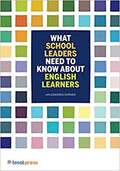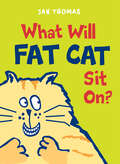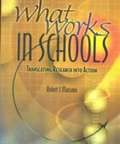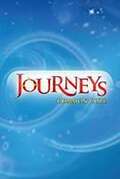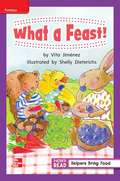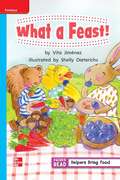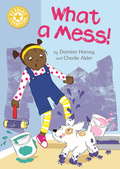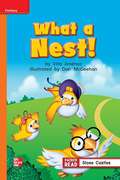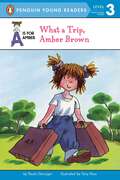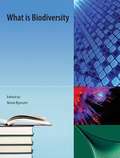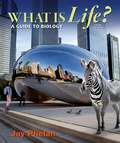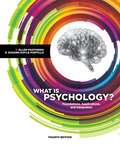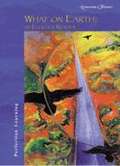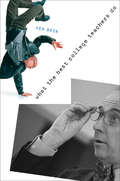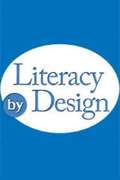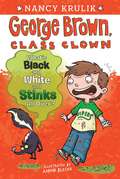- Table View
- List View
What School Leaders Need to Know About English Learners
by Jan DormerSchool leaders have the unique opportunity and responsibility to play a crucial role in creating a culture of high expectations and an environment of support so that English language learners can succeed and continue to enrich the fabric of our country. <p><p> What School Leaders Need to Know About English Learners offers school leaders the foundation, the ideas, and the strategies to not only improve outcomes for English language learners, but to create rich multicultural and multilingual school environments which benefit all students. This book equips school leaders with effective, research-based strategies and best practices to help both ESOL and content-area teachers succeed in their roles. Includes a Professional Development Guide and a rich array of "Grab and Go" online resources. Copublished with National Association of Secondary School Principals (NASSP).
What Should Constitutions Do?
by Ellen Frankel Paul Jeffrey Paul Fred D. Miller Jr.The essays in this volume - written by prominent philosophers, political scientists and legal scholars - address the basic purposes of constitutions and their status as fundamental law. Some deal with specific constitutional provisions: they ask, for example, which branches of government should have the authority to conduct foreign policy, or how the judiciary should be organized, or what role a preamble should play in a nation's founding document. Other essays explore questions of constitutional design: they consider the advantages of a federal system of government, or the challenges of designing a constitution for a pluralistic society - or they ask what form of constitution best promotes personal liberty and economic prosperity.
What Will Fat Cat Sit On? (The Giggle Gang)
by Jan ThomasThis &“rollicking&” picture book is &“laugh-out-loud&” fun for new readers (Publishers Weekly, starred review).What will Fat Cat sit on? The pig? (Oink!) The chicken? (Cluck!) How about the dog? (Grrrr.) Everyone in this bumbling animal gang—understandably—hopes the victim will be someone else! Leave it to Mouse to come up with a brilliant solution that satisfies everyone, even Fat Cat himself.Filled with hilarious asides and an interactive question-answer format, this irreverent picture book will delight little ones who love to shout &“NO!&”&“Fun to read aloud, it would also make an effective early reader for preschoolers.&”—The New York Times Book Review &“A cat that puts Garfield to shame…a lot of laughs. This is a book that toddlers and new readers will reach for again and again.&”—Kirkus Reviews
What Works in Schools: Translating Research into Action
by Robert J. MarzanoSchools can and do make a difference in students' lives. Make your school and personal instruction even more effective using the insights offered in this textbook. Drawing on 35 years of research, the author defines the factors most strongly affecting student achievement and offers specific and attainable action steps to implement successful strategies for student achievement and effective public education.
What a Beautiful Sky! (Journeys Grade K Little Big Book Unit 3 #Book 15)
by Yanitzia CanettiNIMAC-sourced textbook
What a Mess!: Independent Reading Yellow 3 (Reading Champion #464)
by Damian HarveyJazz wants to help her mum and dad with the painting. They are happy for her to help, as long as she doesn't make a mess!Reading Champion offers independent reading books for children to practise and reinforce their developing reading skills.Fantastic, original stories are accompanied by engaging artwork and a reading activity. Each book has been carefully graded so that it can be matched to a child's reading ability, encouraging reading for pleasure.
What a Pain! (Fountas & Pinnell Classroom, Guided Reading)
by Michelle OlmstedNIMAC-sourced textbook. Why It Hurts to Get Hurt. There's a reason why you feel pain. Learn why it hurts so much when you bite your tongue or burn your finger.
What a Shop! (Reach Into Phonics Ser.)
by Deborah J. Short Dee Wallis Kelsey BruceNIMAC-sourced textbook
What a Trip, Amber Brown (A Is for Amber #1)
by Paula DanzigerBest friends Amber Brown and Justin Daniels are taking a vacation together! There’s just one problem—Justin’s little brother, Danny. He always wants to tag along. Can Amber find a way to make Danny go away so she can have Justin all to herself?
What is Biodiversity
by Melina Laverty Eleanor Sterling Ian Harrison James Gibbs Robert AhlfingerThis collection provides an overview of what is meant by the term 'biodiversity,' and how we measure it. The collection reviews the different levels of biodiversity, or the 'biodiversity hierarchy' including: genetic and phenotypic diversity; population diversity; species diversity; community diversity; ecosystem diversity; landscape diversity; and historical and ecological biogeographic diversity. Brief definitions of populations, species, communities, and ecosystems are provided, with some introductory discussion of different types of 'species concepts.' The collection defines the terms 'species richness' and 'species evenness' as methods for measuring species diversity, and it discusses the use of species richness as a surrogate for describing overall global biodiversity. The collection reviews the distribution of biodiversity in space, explaining the definitions of alpha, beta and gamma diversity for measuring diversity within and between ecosystems. The environmental factors that affect these patterns of spatial diversity are briefly discussed. The collection also includes a brief review of the different ways by which assessments of spatial diversity are used for conservation planning and management (e.g., based on ecoregions, or biodiversity hotspots and coldspots). The collection concludes with a brief discussion of diversity over geological time.
What is Life? A Guide to Biology
by Jay PhelanThis Biology book presents all the important topics under the following sections : The Facts of Life,Genetics, Evolution, and Behaviour, Evolution and the Diversity of life,Ecology and the Environment.
What is Psychology?: Foundations, Applications, and Integration
by Ellen E. Pastorino Susann M. Doyle-PortilloWHAT IS PSYCHOLOGY? FOUNDATIONS, APPLICATIONS, AND INTEGRATION includes some of the most effective features from Pastorino and Doyle-Portillo's other texts, as well as new and innovative features to excite students about the field of psychology. The text is organized around the foundational areas of psychology emphasized in the latest version of the APA guidelines. It incorporates the authors' successful and engaging teaching approach, which motivates students to read and captures their curiosity from the very beginning. The parts open with attention-grabbing case studies that have drawn rave reviews from students. Each case study is threaded throughout all of the chapters of the section, providing students with a view of the content that is both integrated and applied to real life.
What on Earth?, An Ecology Reader
by the editors at Perfection Learning CorporationNIMAC-sourced textbook
What the Best College Teachers Do
by Ken BainWhat makes a great teacher great? Who are the professors that students remember long after graduation? This book, the conclusion of a fifteen-year study of nearly one hundred college teachers in a wide variety of fields and universities, offers valuable answers for all educators. The short answer is-- it's not what teachers do, it's what they understand. Lesson plans and lecture notes matter less than the special way teachers comprehend the subject and value human learning. Whether historians or physicists, in El Paso or St. Paul, the best teachers know their subjects inside and out-- but they also know how to engage and challenge students and to provoke impassioned responses. Most of all, they believe two things fervently: that teaching matters and that students can learn. In stories both humorous and touching, Bain describes examples of ingenuity and compassion, of students' discoveries of new ideas and the depth of their own potential. What the Best College Teachers Do is a treasure trove of insight and inspiration for first-year teachers and seasoned educators.
What's Black and White and Stinks All Over? #4
by Nancy Krulik Aaron BlechaGeorge Brown's super burps are causing serious trouble for poor George again. And this time the trouble really stinks! The super burp strikes on Field Day during an outdoor class scavenger hunt. George vows to keep out of any mischief, but he winds up getting skunked. .

